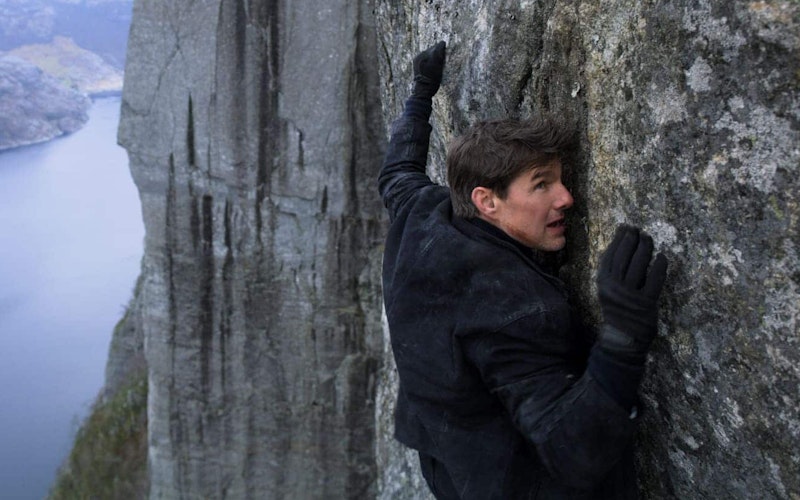
Movies
Miracles and Mission: Impossible
God tends to intervene in the Mission: Impossible movies. When Tom Cruise, as American agent Ethan Hunt, sprints down a hill, jumps onto the wing of an Airbus A400M, and holds onto the exterior door as the plane takes off, some force outside of Cruise’s own capabilities must be lending a hand. To say that Cruise/Hunt performs miracles in the Mission: Impossible films is not an overstatement. In fact, it is the main premise of the franchise. When given an impossible mission, Hunt and his team respond with a faithfulness that results in extraordinary achievements.
In Mission: Impossible — Fallout, the sixth and latest installment in the 22-year-old franchise, characters repeatedly extol Ethan Hunt’s transcendent qualities. In their eyes, the world would stop spinning if not for his espionage exploits. One character casts a vision of Hunt as a guardian angel whose existence allows her to sleep soundly at night. His teammates Luther (Ving Rhames) and Benji (Simon Pegg) ascribe a certain supernatural quality to Hunt’s abilities. When there is concern that Hunt won’t be able to disable a detonator in time, Luther confidently declares that Hunt will somehow manage it. There is fear in his eyes, but like a good Calvinist, he rests in the assurance of salvation.
Consider Hunt’s achievements in light of this definition of the miraculous, provided by theologian Graham Twelftree: “For Paul, then, the miraculous arguably involved not simply what might be regarded as impossible, but a range of phenomena understood to be from God contributing to the health and welfare of the community and its members.” Throughout the series, Hunt performs a range of stunts that many would assume are impossible (not to mention impossible to film). In Rogue Nation, after clinging to that Airbus, Hunt survives an encounter with an assassin at the Vienna State Opera, participates in a high-speed motorcycle chase, and swims to an underwater vault. And his survival and success in each case is not only his own, but the world’s, considering his missions involve stopping nuclear threats, taking down high-powered crime syndicates, and outing corrupt government agents. Could all of this really be possible without a divine, guiding hand, one that holds the fate of the world?
God tends to intervene in the Mission: Impossible movies.
Of course most people buy tickets to the Mission: Impossible films for the audacity of these stunts, not any hints of theology they might contain. Perhaps the most admired sequence of the franchise comes halfway through the fourth film, Ghost Protocol, when Ethan and his team must gain access to a hotel’s server room. The problem is that the hotel is Dubai’s Burj Khalifa, the tallest structure in the world, and the only way to the server room, on the 130th floor, is from the outside. And so Hunt must climb out of a window and scale the side of the building. “How am I supposed to do this?” he asks his team. They respond with a plan involving suction gloves; it’s Hunt who must have faith. As he tiptoes toward the edge, the camera glides up his back, over his head, and looks down to the ground, invoking nauseating vertigo. When he takes that first step, the camera never cuts. We’re witnessing, wide-eyed, a miracle.
As a leap of faith, the moment also brings us back to theology. Recall Peter’s words when he and the other disciples discover Jesus approaching them on the water in the middle of a storm: “Lord, if it’s you...tell me to come to you on the water.” Peter likely briefly hesitated at the edge, knowing that he was about to defy the laws of nature. But he took that massive step, and his faith was initially rewarded. When he faltered soon after—much like Hunt’s wonky suction glove, which loses its power while he’s clinging to the glass—Peter's savior was there to grab him.
By my count, Ethan Hunt has died and come back to life twice. In Mission: Impossible III, he recruits Julia (Michelle Monaghan), his wife at the time, to electrocute him so that a dangerous implant in his head can be deactivated. He does so in hope that Julia, a nurse, will be able to revive him. He is dead for several minutes before she does. Rogue Nation also features Hunt’s heart momentarily stopping after drowning. This continual theme of revival and resurrection recalls some of the key miracles in the New Testament, including that of Lazarus. When Jesus approaches Lazarus’ tomb, he says, “Did I not tell you that if you believe, you will see the glory of God?” Might Hunt’s miracles reveal something similar?
During the aforementioned dive in Rogue Nation, Hunt has only a few minutes’ worth of air to reach the underwater vault. Once there, he must switch out a crucial information card. Below the surface, the world is dark. Hunt extracts the card, but both it and the replacement are knocked out of his hand before he can switch them. He goes after the cards, but the more he swims, the less oxygen he has. Finally he recovers them, yet he no longer knows which one is which. He takes a chance and inserts one. It works, but only by chance.
Or maybe it’s something else. By occasionally allowing Hunt to have no control over his situation, the Mission: Impossible films allow glory to sneak in. And that’s when something miraculous occurs: walking on water, rising from the dead, or—in the case of both the Mission: Impossible franchise and the gospel itself—saving the world.
Topics: Movies